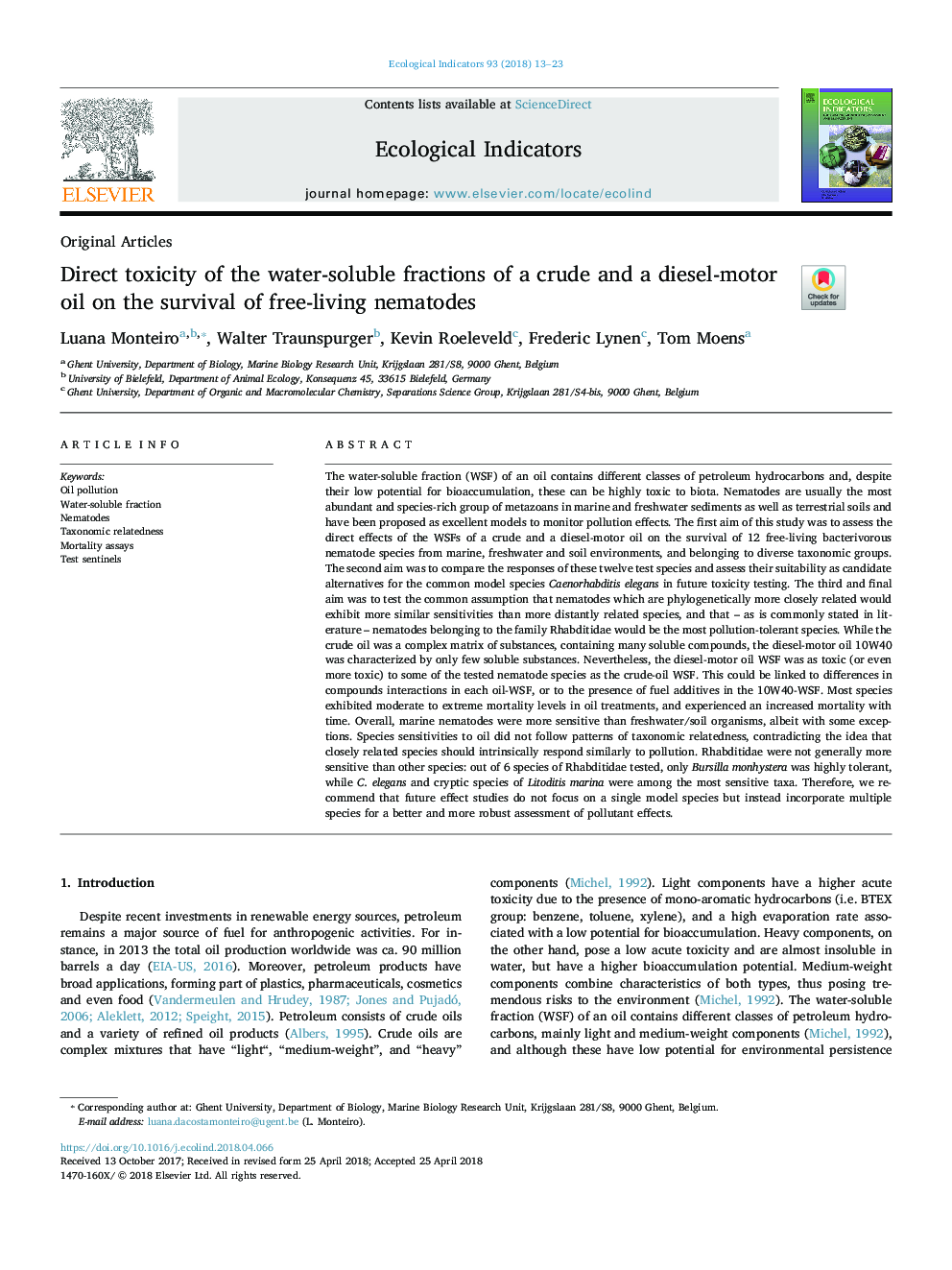| کد مقاله | کد نشریه | سال انتشار | مقاله انگلیسی | نسخه تمام متن |
|---|---|---|---|---|
| 8845086 | 1617109 | 2018 | 11 صفحه PDF | دانلود رایگان |
عنوان انگلیسی مقاله ISI
Direct toxicity of the water-soluble fractions of a crude and a diesel-motor oil on the survival of free-living nematodes
ترجمه فارسی عنوان
سمیت مستقیم از قطعات حل شده در آب یک روغن خام و دیزل بر روی بقای نماتدهای آزاد زندگی
دانلود مقاله + سفارش ترجمه
دانلود مقاله ISI انگلیسی
رایگان برای ایرانیان
کلمات کلیدی
آلودگی نفتی، کسر محلول در آب، نماتدها، وابستگی تاکسونومی، آزمایشات مرگ و میر، تست نگهبانان،
موضوعات مرتبط
علوم زیستی و بیوفناوری
علوم کشاورزی و بیولوژیک
بوم شناسی، تکامل، رفتار و سامانه شناسی
چکیده انگلیسی
The water-soluble fraction (WSF) of an oil contains different classes of petroleum hydrocarbons and, despite their low potential for bioaccumulation, these can be highly toxic to biota. Nematodes are usually the most abundant and species-rich group of metazoans in marine and freshwater sediments as well as terrestrial soils and have been proposed as excellent models to monitor pollution effects. The first aim of this study was to assess the direct effects of the WSFs of a crude and a diesel-motor oil on the survival of 12 free-living bacterivorous nematode species from marine, freshwater and soil environments, and belonging to diverse taxonomic groups. The second aim was to compare the responses of these twelve test species and assess their suitability as candidate alternatives for the common model species Caenorhabditis elegans in future toxicity testing. The third and final aim was to test the common assumption that nematodes which are phylogenetically more closely related would exhibit more similar sensitivities than more distantly related species, and that - as is commonly stated in literature - nematodes belonging to the family Rhabditidae would be the most pollution-tolerant species. While the crude oil was a complex matrix of substances, containing many soluble compounds, the diesel-motor oil 10W40 was characterized by only few soluble substances. Nevertheless, the diesel-motor oil WSF was as toxic (or even more toxic) to some of the tested nematode species as the crude-oil WSF. This could be linked to differences in compounds interactions in each oil-WSF, or to the presence of fuel additives in the 10W40-WSF. Most species exhibited moderate to extreme mortality levels in oil treatments, and experienced an increased mortality with time. Overall, marine nematodes were more sensitive than freshwater/soil organisms, albeit with some exceptions. Species sensitivities to oil did not follow patterns of taxonomic relatedness, contradicting the idea that closely related species should intrinsically respond similarly to pollution. Rhabditidae were not generally more sensitive than other species: out of 6 species of Rhabditidae tested, only Bursilla monhystera was highly tolerant, while C. elegans and cryptic species of Litoditis marina were among the most sensitive taxa. Therefore, we recommend that future effect studies do not focus on a single model species but instead incorporate multiple species for a better and more robust assessment of pollutant effects.
ناشر
Database: Elsevier - ScienceDirect (ساینس دایرکت)
Journal: Ecological Indicators - Volume 93, October 2018, Pages 13-23
Journal: Ecological Indicators - Volume 93, October 2018, Pages 13-23
نویسندگان
Luana Monteiro, Walter Traunspurger, Kevin Roeleveld, Frederic Lynen, Tom Moens,
